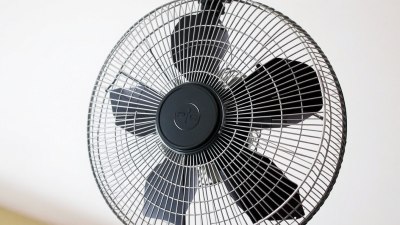When the Fan Is Too Noisy but You Still Forgive It
Explore why noisy fans in homes and devices can be forgiven despite their sound, balancing comfort and function.

Image created with Flux Schnell
Every household or workspace has moments when familiar sounds become a subject of intense scrutiny. Among these sounds, the hum or whirring noise of a fan often stands out, especially when it becomes louder than usual. Although a noisy fan can be annoying, many people find themselves forgiving this disturbance because of the fan’s undeniable benefits. This article dives into why we tolerate and even forgive noisy fans despite the discomfort their sound may cause.
Understanding the Role of Fans in Daily Life
Fans are an integral part of modern living, providing cooling relief, improving air circulation, and even assisting in the ventilation of electronic devices. They come in various forms, such as ceiling fans, desk fans, exhaust fans, and cooling fans inside computers and appliances. The primary reason fans are used is to move air, reducing the temperature in the surrounding environment or preventing overheating of components.
In warm climates or during summer months, fans are especially critical for comfort and health. They help reduce perspiration and maintain a cooler atmosphere, sometimes offering the only affordable method of cooling for many households. Without fans, many would suffer from heat-related discomfort or health risks.
Why Fans Become Noisy
A noisy fan can be caused by several factors, ranging from mechanical wear and tear to environmental conditions. Common causes include dust accumulation on fan blades, loose components, imbalanced blades, motor issues, or lack of lubrication. As fans age or are used in dusty or humid conditions, these factors become more pronounced, contributing to louder and sometimes disturbing operations.
When a fan becomes too noisy, it usually signals the need for maintenance or replacement, as the noise often correlates with decreased efficiency or the beginning of mechanical failure. Sounds like grinding, rattling, or loud humming can indicate parts are misaligned or malfunctioning.
The Psychological Impact of Noisy Fans
The sound of a fan is multifaceted in its psychological effects. On one hand, a gentle, rhythmic hum from a fan can provide a soothing background noise similar to white noise, which many people find relaxing or useful for focusing or sleeping. On the other hand, when the noise becomes erratic, loud, or harsh, it can cause irritation, stress, and distraction.
Interestingly, people’s reactions to noisy fans can vary widely depending on their personal sensitivity to sound, their attachment to the fan’s benefits, or their tolerance levels. Some individuals may accept the noise as a trade-off for the fan’s cooling effects, while others may be driven to immediately address or remove the source of sound.
Why We Forgive Noisy Fans
Despite the annoyance, many continue to forgive noisy fans because of the essential benefits they provide. The forgiveness is often rooted in the following reasons:
- Comfort Prioritization: The cooling or ventilation benefits often outweigh the temporary annoyance of noise, especially in hot environments.
- Familiarity: Continuous exposure to the fan’s hum creates a familiarity that can lead to habituation, where the noise becomes part of the background and is less consciously noticed.
- Lack of Alternatives: For some, replacing or repairing a fan may not be immediately feasible due to cost, availability of replacements, or time constraints.
- Associative Positive Memories: In some cases, the sound of a familiar fan is linked with positive memories, such as childhood summers or relaxing evening routines, which can soften annoyance.
These reasons help explain why people tolerate, and even forgive, noisy fans despite their disruptions.
The Balancing Act: Noise vs. Necessity
In many situations, the presence of a noisy fan is considered an acceptable compromise between noise pollution and the necessity of thermal management. In workplaces with sensitive equipment, fans prevent overheating and protect valuable investments, making their noise an unavoidable part of everyday operations. Similarly, at home, fans provide affordable cooling without the need for expensive air conditioners.
This balancing act is reflected in choices people make, opting to live with noise for the sake of the benefits derived. The cognitive process often involves rationalizing the discomfort by focusing on the overall gains, like better sleep quality or equipment protection.
How to Reduce Fan Noise Without Losing Benefits
While forgiving noisy fans is common, many seek ways to reduce noise while maintaining functionality. There are practical steps that can be taken:
- Regular Cleaning: Dust and dirt buildup significantly increase fan noise. Routine cleaning helps maintain smooth operation.
- Proper Lubrication: Lubricating fan motors reduces friction and associated noise.
- Blade Adjustment: Ensuring blades are balanced and properly secured can prevent rattling and vibrations that amplify noise.
- Use of Sound Dampening Materials: Placing fans on vibration-absorbing pads or enclosures can reduce noise transmission.
- Replacing Worn Components: Timely repair or replacement of faulty bearings or motors can restore quieter function.
These interventions help in managing noise levels, making fans more tolerable and decreasing the need for sheer forgiveness.
When to Replace the Fan
Despite maintenance efforts, there are times when a noisy fan must be replaced. Signs that replacement is necessary include persistent loud noise even after cleaning and repair, decreased airflow, overheating, or electrical issues like flickering power. Continuing to use a severely faulty fan can lead to safety hazards such as electric shocks or fire risks.
Proactively replacing a noisy fan ensures safety, comfort, and optimal performance, balancing forgiveness with prudent action.
Cultural Perception of Fan Noise
Fan noise perception also varies culturally. In some regions, the constant droning of fans is a hallmark of daily life and is embedded in the soundscape, while in others, such background noise may be less common and more distracting. This cultural context influences whether noisy fans are tolerated or considered nuisances.
Moreover, some cultures embrace white noise from fans to aid in meditation, relaxation, or sleep, associating the sound with peace and calmness. This cultural acceptance further influences the level of forgiveness toward noisy fans.
Environmental Implications
Fans are generally more environmentally friendly than air conditioning systems. The energy consumption of fans is relatively low, and this efficiency is a key reason why many prefer fans despite their noise. Forgiving a noisy fan may also stem from an environmental consciousness to avoid high energy-use alternatives.
Choosing a noisy fan over more energy-intensive cooling options reflects a trade-off between acoustic comfort and ecological responsibility. This dynamic adds another layer to why people accept fan noise.
Technological Advances in Fan Design
In recent years, technological advances have aimed to reduce fan noise while enhancing performance. Innovations include aerodynamic blade design, improved motor technology, and smart speed controls. Such improvements help minimize noise at higher efficiency levels, allowing users to enjoy cooling benefits without disturbing sounds.
These developments illustrate that while forgiveness for noisy fans remains common, the push for quieter solutions continues, driven by user demand for comfort and progress in engineering.
Practical Tips to Cope with Fan Noise
For those living with noisy fans, there are coping strategies to reduce irritation:
- Use White Noise Generators: Adding other white noise sources can mask irregular fan sounds.
- Ear Plugs or Headphones: Helpful during sleep or concentration periods.
- Rearranging Room Layout: Position fans away from seating or sleeping areas.
- Set Fan Speed Appropriately: Lower speeds often produce less noise while still providing cooling.
These approaches aim to enhance tolerance and reduce the impact of fan noise on daily life.
The phenomenon of forgiving noisy fans is a complex interplay of comfort, necessity, cultural acceptance, and practical constraints. Fans serve vital functions, and their occasional noise is often tolerated because the benefits they offer outweigh the annoyances. Through maintenance, technological advances, and coping strategies, it is possible to reduce noise impacts, but the core reason for forgiveness remains the essential role fans play in everyday life.











